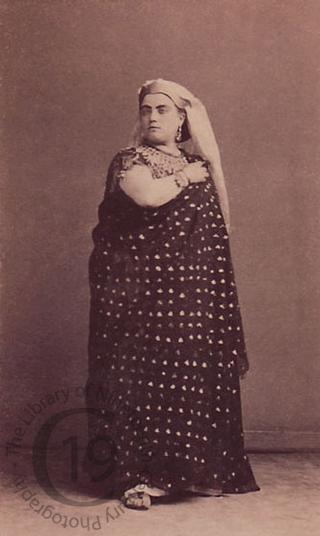
Marie Saxe
A carte-de-visite portrait of the Belgian soprano Marie Saxe, dressed in the costume she wore as Sélika in Meyerbeer’s L’Africaine, a role she created in 1865.
The last work of the composer Giacomo Meyerbeer, with a French libretto written by Eugène Scribe, the grand opera L’Africaine depicts fictitious events in the life of the explorer Vasco da Gama. In fact, Meyerbeer’s working title for the opera was ‘Vasco da Gama’, the hero. It was given its present title by François-Joseph Fétis, who prepared the final version in the year following Meyerbeer’s death. The opera premièred at the Paris Opéra on 25 April 1865. It was first performed at London’s Covent Garden on 22 July 1865 and in New York on 1 December 1865.
Enormously successful in the 19th century, today the opera is rarely revived. Most modern performances and recordings are severely cut to give prominence to the parts of da Gama and Sélika, and therefore cannot give a full idea of the composer's conception, which in any case has to some extent been obscured by Fétis’s version. Furthermore, its arias today when recorded are often sung in Italian rather than in French.
Gabriela Cruz has published a detailed analysis of the historical context of the events of the opera and the opera setting itself.
Code: 123049




